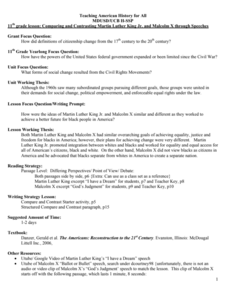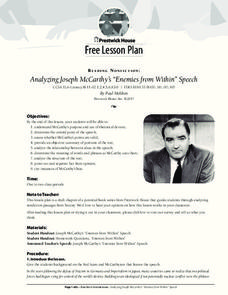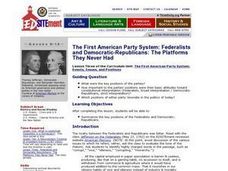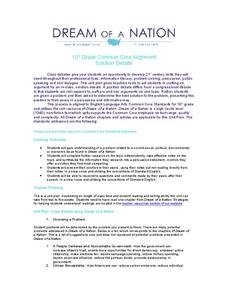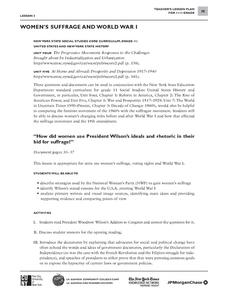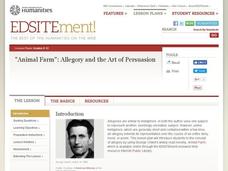Prestwick House
Rhetorical Devices in Political Speeches
Have you ever watched a political speech and felt your heart beat a little faster, and your opinion either solidify or begin to slightly change? Rhetorical devices can be a strong tool in an effective and powerful speech. A short lesson...
Newseum
Disinformation Nation: Separating Politics and Propaganda
Separating political rhetoric from propaganda is no small feat. Class members are challenged to examine two different sources about a candidate in an upcoming election and determine whether the primary purpose of the source is to inform...
Curated OER
Liberty Rhetoric
What is liberty rhetoric? Examine how people have used it in four different time periods and situations. High schoolers investigate original source documents and compare them with the Declaration of Independence to decide how liberty...
Center for History Education
Lincoln and the Republicans: The Cause of the War?
In today's political rhetoric, many forget the pivotal role the Republican Party played in the causes of the Civil War. The party's formation was the final straw for Southerners who saw the enslavement of people of African descent a...
Curated OER
Persuasion and Political Debate by PBS
Students examine rhetorical strategies. In this political debate lesson plan, students research issues of presidential campaigns and deliver persuasive speeches about the issues they research. Students then participate in debates based...
Encyclopedia Britannica
Candidate Flip-Flop or Evolution?
Beware political rhetoric! Connotation is everything! Groups select a presidential candidate and investigate how the candidate's position has changed on a specific issue. After analyzing the situation, the group determines whether they...
Rancocas Valley Regional High School
Teaching American History for All
Although Dr. Martin Luther King, Jr. and Malcolm X both work for equal rights, social change, and political empowerment, their approaches were radically different. To better understand these contrasts, class members compare King's "I...
Prestwick House
Reading Nonfiction: Analyzing Joseph McCarthy's "Enemies from Within" Speech
Looking for a lesson plan that teaches class members how to analyze nonfiction? Use Joseph McCarthy's famous "Enemies from Within" speech as a instructional text. Worksheet questions direct readers' attention to the many historical...
EngageNY
TASC Transition Curriculum: Workshop 12
How can opinions slant facts? Workshop participants learn how to examine primary and secondary sources and identify the author's point of view. They also examine how visual art impacts the meaning and rhetoric of sources. Full of...
Dream of a Nation
Creating Awareness through Action Oriented Writing and Research
Middle schoolers aren't too young to feel strongly about politics, social issues, consumer rights, or environmental problems. Demonstrate the first steps toward social change with a project about action-oriented writing. Eighth graders...
Curated OER
The First American Party System: Federalists and Democratic-Republicans: The Platforms They Never Had
Students investigate the beginnings of the political party system in the US. They determine the key positions of both the Federalists and the Democratic-Republicans. They compare the views of the early political parties with those of today.
Dream of a Nation
Solution Debate
Class members choose a current social, political, environmental, or economic problem presented in Tyson Miller's Dream of a Nation: Inspiring Ideas for a Better America, research this problem and a variety of suggested solutions, before...
Mikva Challenge
Deconstructing Campaign Messages and Perceptions
Target audience, covert message, explicit and implicit appeals. As part of an investigation of rhetorical devices used in campaign ads, class members examine and deconstruct the appeals in logos from the 2008 election. They then use the...
National Endowment for the Humanities
Shakespeare's Julius Caesar: Leadership and a Global Stage
Shakespeare's Julius Caesar is, among other things, the study of a ruler's ambitions. Young scholars watch videos, read articles, and keep a Commonplace Book while studying the play. At the end of Act III, pupils stage the play that...
C-SPAN
Landmark Supreme Court Case: Roe v Wade
Perhaps no issue is as controversial than abortion in the American landscape. Go beyond the rhetoric by examining the Supreme Court case that legalized abortion in the United States. A guided note-taking activity unpacks the arguments...
National Endowment for the Humanities
Cultural Change
High schoolers research the passage of the 19th Amendment as an illustration of the mutual influence between political ideas and cultural attitudes. They also read the Seneca Falls Declaration and explore the cultural shifts it both...
National Endowment for the Humanities
Common Sense: The Rhetoric of Popular Democracy
Students identify important arguments for independence made in Thomas Paine's Common Sense. They explain why these arguments helped persuade American colonists that independence was necessary. Students describe the importance of Common...
Historical Thinking Matters
Social Security: 3 Day Lesson
What does social security reveal about the political and social culture of the 1930s? After beginning with a brief introductory video on the impact of the Great Depression and how various Americans, such as Huey Long and Francis...
Curated OER
Hamilton and Burr : Compare and Contrast
Who were Aaron Burr and Alexander Hamilton? High schoolers examine the character traits of these historical figures and watch the video, The Duel. Hamilton vs. Burr: An Event that Changed History (available from PBS), to gain an...
City University of New York
Woman's Suffrage and World War I
How did women use President Wilson's ideals and rhetoric in their bid for suffrage? To answer this essential question, class groups analyze primary written documents and visual images.
Curated OER
Mark Twain: Straddling the Civil War
Mark Twain's life, politics, writing, and role as a mirror of pre- and post-Civil War American culture are the focus 11th and 12th graders in this section from an expansive author study. A critical writing assignment comparing Twain to...
C-SPAN
Should States Shift to Mail-In Voting during the Coronavirus Pandemic?
With the coronavirus pausing many norms in American society, officials are trying to decide how to safely hold voting in the 2020 presidential election. Using curated video clips, including speeches from Congress, journalists, and...
Curated OER
John Gary Evans and the Politics of Race
Young scholars read letters written by Evans and Gunton regarding race relations. In this Progressive Movement lesson, students interpret the intentions and tone of the letters to understand contemporary racial beliefs. Young scholars...
National Endowment for the Humanities
Animal Farm: Allegory and the Art of Persuasion
Introduce your class members to allegory and propaganda with a series of activities designed to accompany a study of George Orwell's Animal Farm. Readers examine the text as an allegory, consider the parallels to collective farms and the...








